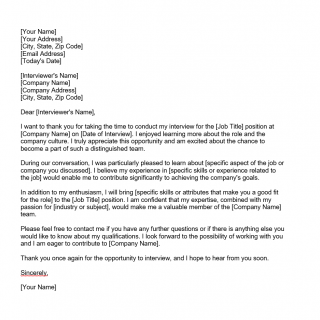Thank You Letter After Interview
A Thank You Letter After Interview is a formal document that allows an interviewee to express appreciation and gratitude for the opportunity to interview with a potential employer. It showcases professionalism and leaves a positive impression on the interviewer, enhancing the chances of securing the position.
The form typically consists of the following parts:
- Salutation: Address the interviewer politely by their appropriate title (e.g., Mr., Mrs., Dr.).
- Introduction: Open the letter by thanking the interviewer for their time and the opportunity to interview for the position.
- Summary: Briefly reiterate your interest in the job and summarize key points discussed during the interview, demonstrating how your skills and experience align with the company's needs.
- Additional information: If necessary, provide any relevant information that may not have been covered during the interview.
- Closing: Express your enthusiasm for the company and the position, and mention any next steps or follow-ups required.
- Sign-off: End the letter by thanking the interviewer once again and providing your contact information.
The most important fields in a Thank You Letter After Interview include the introductory and summary sections, where you reinforce your qualifications and interest in the position.
This form is compiled by the job applicant and addressed to the interviewer or potential employer.
When compiling the letter, candidates should consider the following:
- Send the letter promptly, ideally within 24 hours of the interview.
- Use a professional tone and format.
- Be clear, concise, and error-free.
- Tailor the letter to the specific interview and company, avoiding generic statements.
Sample:
[Your Name]
[Your Address]
[City, State, Zip Code]
[Email Address]
[Today's Date][Interviewer's Name]
[Company Name]
[Company Address]
[City, State, Zip Code]Dear [Interviewer's Name],
I want to thank you for taking the time to conduct my interview for the [Job Title] position at [Company Name] on [Date of Interview]. I enjoyed learning more about the role and the company culture. I truly appreciate this opportunity and am excited about the chance to become a part of such a distinguished team.
During our conversation, I was particularly pleased to learn about [specific aspect of the job or company you discussed]. I believe my experience in [specific skills or experience related to the job] would enable me to contribute significantly to achieving the company's goals.
In addition to my enthusiasm, I will bring [specific skills or attributes that make you a good fit for the role] to the [Job Title] position. I am confident that my expertise, combined with my passion for [industry or subject], would make me a valuable member of the [Company Name] team.
Please feel free to contact me if you have any further questions or if there is anything else you would like to know about my qualifications. I look forward to the possibility of working with you and I am eager to contribute to [Company Name].
Thank you once again for the opportunity to interview, and I hope to hear from you soon.
Sincerely,
[Your Name]
The advantages of sending a Thank You Letter After Interview include leaving a positive impression, demonstrating professionalism, and ensuring you stay in the minds of the interviewer, which potentially increases your chance of being offered the job.
Problems that can arise when filling out the form include being overly lengthy, using an informal tone or incorrect information, and not sending the letter promptly.
Related forms include Thank You Letters for multiple interviewers, panel interviews, and phone or video interviews. Alternative forms may include follow-up emails, although a formal letter is often preferred for its professional appearance.
The Thank You Letter After Interview should be submitted via email or postal mail, depending on the interviewer's preference or company guideline. The letter's instances are usually stored by the interviewer or the company's human resources department, and may be added to the candidate's application file.

